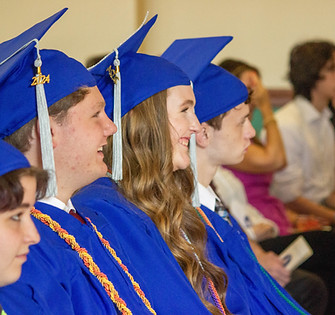Academic/College Counseling
Academic and college counseling at Mercy Academy is led by the
School Counselor, Sarah Kaczenski, MSW/LICSW. At Mercy, we promote the personal growth of students and provide them with the strategies
necessary for educational, spiritual, career, and social development.
Our educational philosophy
-
All students are unique and have specific learning needs and styles.
-
Education is a team endeavor; it requires commitment from
students, families, faculty, and the community.
-
Students should be strong self-advocates.
-
Mistakes and trials should not be feared; they are opportunities for
growth, learning, and building resilience.
-
School should be fun and challenging.
The following plan highlights the process in which students will engage
throughout their time at Mercy Academy as they work towards
graduation and prepare for life after high school.
Our School Counselor has an open-door policy, which allows students to drop in at any time or make appointments to discuss college and career planning. This is most helpful when students are seeking an individualized college or career preparation plan.
9TH GRADE
During their first year of school, students meet individually with the School Counselor to get to know one another and to understand students' goals while at Mercy Academy. These are some of the questions addressed in those meetings.
* What types of classes interest you most?
* What classes do you find most challenging?
* What school clubs would you be interested in joining?
* What elective classes would you like to see us create at Mercy?
* Who do you usually eat lunch with?
* What are your academic goals?
* Are you already interested in a career path?
* Are you interested in going to college?
* What types of activities do you do when you’re not
in school?
During these initial meetings a plan for each student’s academic career at Mercy Academy will be tentatively set.
STANDARDIZED TESTING
Standardized testing test will be administered during the fall and spring to track student progress and achievement
over time.
10TH GRADE
College Prep Timeline for Sophomores
Students meet individually with the School Counselor during the first semester to discuss/review academic goals and outline course selections for junior and senior year.
Sophomores are invited to attend any presentations given by college recruiters visiting Mercy Academy.
Exploration of different websites dedicated to focusing the college search process will begin during the sophomore year.
PSAT10
All 10th grade students will take the PSAT10 during the spring at Mercy. Students are encouraged to link their test results to Khan Academy, which will create personalized SAT practice recommendations based on their results.
Summer
Students should thoughtfully consider their summer plans. Plans may include getting a job, attending a summer/sports camp, or participating in a campus program to explore fields of interest and get a taste of college life.
11TH GRADE
College Prep Timeline for Juniors
This is the year that college and career planning really begins to ramp up. The following is a list of activities that juniors will be engaged in throughout the year to help prepare them for the next steps after Mercy Academy, as well as some recommendations.
Juniors are invited/required to attend presentations given by college recruiters visiting Mercy Academy.
Students meet individually with the School Counselor during the year to review transcripts, ensuring that students are on track to meet all graduation requirements. Students will also explore different websites focused on narrowing their college search and major.
PSAT/NMSQT
In October, all juniors take the PSAT/NMSQT at Mercy. Students will be encouraged to link their test results to Khan Academy, which will create personalized SAT practice recommendations based on their results.
Starting in the month of December, the School Counselor will be available during Flex-time, by appointment, to discuss college and career plans. All juniors are required to schedule at least one meeting.
Students should consider visiting colleges during Christmas, mid-Winter, and Spring Break.
SAT
All juniors take the SAT at Mercy Academy in March.
In May, students may consider scheduling a ‘mock interview’ with the School Counselor. It is important to practice interviewing skills as some colleges offer or require interviews.
In June, students should schedule college campus visits for the summer and reach out to teachers, coaches, pastors, or employers who would be writing letters of recommendation.
July and August, students begin filling out college applications.
Applying to college or another career program is a joint process between the student, family and school; each has a role to play, but ideally it is driven by the student. This process is a great time for young adults to work on the independence, organizational skills, and motivation to succeed once they leave home and OLMA.
12TH GRADE
College Prep Timeline for Seniors
This is a busy year preparing for life after Mercy Academy. The following is a list of some of the activities students will be engaging in throughout the year to help them and their families successfully navigate the transition to college or a career.
Students are encouraged to take the SAT during the fall. Both in school and Saturday options are available. The English and Math departments are available for students wishing to receive additional help during Flex-time.
The School Counselor will meet individually with seniors during September and October to continue mapping out college and career plans.
Parents and students should review college websites for all requirements/deadlines.
Students should complete the Common Application, finalize essays and supplements, and send test scores prior to application deadlines.
Students and families should continue visiting college campuses. A brochure or website can only show you so much. It is important to get a firsthand view of campuses, students and classrooms.

HELPFUL LINKS
College Board (PSAT/SAT information, plus additional college planning resources)
Khan Academy (SAT preparation)






